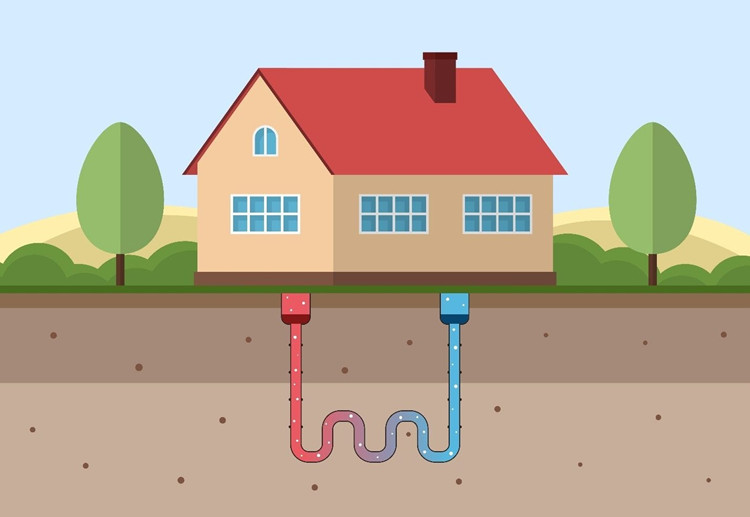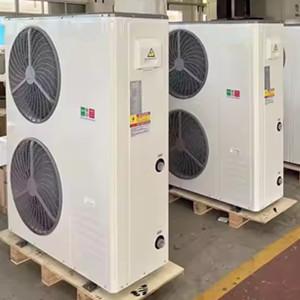How does Geothermal Heating Work in the Winter
Heating your home with a geothermal system in the winter may seem mind-boggling. Cold weather can cause the ground to freeze, which raises the question of just how much heat can be transferred from the ground to your home. The answer is quite a lot. Lower outdoor temperatures and frozen soil have no effect on geothermal systems. The Earth maintains a near-constant temperature of about 55 degrees Fahrenheit just a few feet below the surface. This temperature is enough for a geothermal heat pump to transfer heat from the ground and keep your home comfortable.
How does a geothermal heat pump work?
A liquid solution called refrigerant completes the heat transfer within the heat pump. Refrigerant solutions can switch between gaseous and liquid states with a small amount of energy. The compressor within the heat pump changes the pressure of the refrigerant so that it can collect heat energy or release it. High-pressure refrigerant gets hotter and low-pressure refrigerant gets colder.
Geothermal heat pumps move refrigerant between your home and long pipes buried underground. These pipes are deep enough to reach areas where the temperature remains roughly constant. The compressor, expansion valve, and condenser within the system manage the pressurization and movement of refrigerant. Reduced-pressure refrigerant sent underground can transfer heat from the earth as long as the refrigerant is cooler than the surface.
After collecting the heat into the refrigerant, the system moves it out of the ground and applies more pressure. This further increases the temperature and distributes heat throughout the home. After the refrigerant delivers heat energy into the home, it flows outside under reduced pressure to collect the heat again underground.
Much better than air source heat pumps
The stable 55-degree underground environment allows ground-source heat pumps to perform better than air-source heat pumps in cold climates. Air source heat pumps exchange heat energy with outdoor air rather than the ground. When temperatures drop to around 30 degrees, air source heat pumps begin to lose efficiency and heating capabilities.
Therefore, air source heat pumps require a backup heating system, such as a gas furnace. Otherwise, the house may become cold during harsh winter temperatures. Geothermal systems don’t have to face this. No matter how cold it is on the ground, the geothermal lines that perform heat exchange are always at a temperature that effectively captures heat.
Heat pumps in geothermal systems never have to contend with temperatures approaching that range when results begin to wane. Although the exact underground temperature at your location may vary from 55 degrees due to soil type, the temperature will remain close enough to that for the geothermal system to function properly.

Super efficient
The energy efficiency of geothermal systems is often of interest. Depending on your location and the size of your home, geothermal running costs can be 20 to 70 percent less than traditional heating and cooling technologies. When comparing geothermal to other types of systems, changes in local electricity prices are the main reason for the difference in cost savings.
This efficiency results from the lack of fuel input to generate heat. The system uses only electricity to run the equipment. Therefore, one unit of electricity can produce four times the heat compared to an oil or gas furnace. Since geothermal heat doesn't burn any natural gas or oil in your home, you also avoid worries about exhaust gases containing carbon monoxide.
Geothermal energy has a 400% energy return on investment and is even more efficient than a high-efficiency gas furnace. High-efficiency gas furnaces are only about 95% efficient per unit of energy consumed. Geothermal systems are actually more than four times more efficient than gas furnaces.
The impressive energy efficiency of geothermal heat pumps makes them a green technology. They use only relatively small amounts of electricity and never require direct fossil fuel inputs. As you can imagine, geothermal systems that rely on solar or wind power produce very little pollution.
System size matters
As with any heating and cooling technology, equipment size and capacity are critical to energy efficiency and maintaining home comfort. Variables that determine how to size a system include:
1. Home size
2. Local climate
3. Soil type
Systems that are too small simply cannot transfer enough heat from the ground to cope with the cold temperatures at the surface. In this case, the homeowner loses energy efficiency and has to rely on alternative heat sources.
However, a properly sized geothermal system can avoid inefficiencies and insufficient heat. Leomon has the expertise to build a geothermal system that perfectly meets your heating and cooling needs. We have over two decades of experience with this technology, which is proven to perform well even in harsh winter conditions.
We've built hundreds of geothermal systems and can manage every detail. Our trained technicians can assess your property and calculate the required dimensions of your system to ensure your comfort for decades to come. We supervise the excavation work as well as all technical components for the installation of the heat pump. If you're planning a new build or remodel, asking us about geothermal may reduce your utility bills for years to come.
Will floor heating feel comfortable?
You may find the lower utility bills and reduced pollution from avoiding on-site fossil fuel consumption attractive, but what does geothermal feel like? Geothermal performs extremely well in this regard. Because it operates continuously, it provides consistent comfort throughout your home. The system operates continuously, thereby maintaining a constant temperature in your home. You don't have to wait for the furnace to start. The subtle changes in internal temperature you experience while the furnace waits for the thermostat to activate heat do not exist with geothermal. When the system consumes power, you will get a warm home.
Get more help
Leomon is a professional heat pump manufacturer. If you are considering purchasing a geothermal heat pump, please contact us. Our heat pump manufacturers will give you the cheapest advice.





